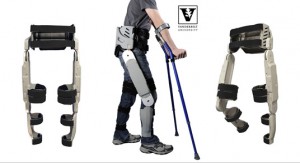So What is Biomedical Engineering..?
I first discovered my major, biomedical engineering, my freshman year of high school when flipping through a book of possible careers. Six years later I am still learning each day more about this major that I’ve chosen as it covers such a wide array of careers. While BME is quite challenging (it is thought to be the hardest major on campus), it is very rewarding.
Biomedical engineering is basically engineering devices for medical purposes. It can range from designing pacemakers to prosthesis to MRIs. Last semester a professor came in to tell us about his research with designing prosthetic legs for paraplegics. When the person leaned forward, the legs started moving, and they could climb stairs when they held on to someone. It was amazing to watch videos of the legs being used and how giving these people their ability to walk could transform their lives. It definitely reminded me of how rewarding this career path can be.

In the area of biomaterials, a class I am currently taking, they are working on creating artificial organs. These organs would reduce the need for organ donors and also the organs could be made from the recipient’s cells so rejection of foreign cells wouldn’t be an issue. When I hear about all this research I am stunned at how it’s all even possible! Medical imaging devices like CT scans and ultrasounds were also designed by biomedical engineers.
There are three major options for what BMEs do after graduation: med school (for the super crazy kids, just kidding… sort of), grad school, or a job! People that go to grad school basically do more research and can get a Master’s and/or PhD to then continue on to do more research in academia or at a company. Then there are those (like me) who want to make money straight out of college and can get a job. Lots of Vandy BME grads go into health care consulting, but you really can go into any industry. BME is a fairly new discipline so often times grads will end up working in other similar types of engineering.
I went to an event in the fall called Opening Dores, in which students could talk to Vandy alum to see what they were doing and the types of jobs available. It was super helpful, and I learned that there are four or five options when working for an engineering company: management (which requires more experience, sometimes an MBA), research (requires a Master’s/PhD, basically you’re developing the product), sales (go to hospitals/doctors/whoever wants to buy your drug/device and convince them that they need it), production (oversee the assembly/machinery that are constructing the device in a factory).
Attending events like Opening Dores and career fairs has helped me learn a ton about the options available and I’d definitely recommend talking to as many people as possible in whatever industry you want to work in. I’d also heavily recommend doing internships/research to learn what you like and what you don’t! Last summer I worked in a cancer biology lab (not exactly BME, but I definitely got the research experience). It was an incredible summer where I learned all about the world of grad students but I learned that research is not for me. Overall, biomedical engineering is a ton of work, but remembering how I will be able to help people in the medical field makes it all totally worth it!